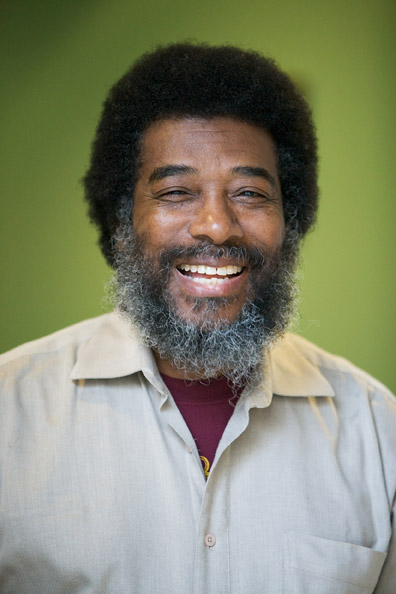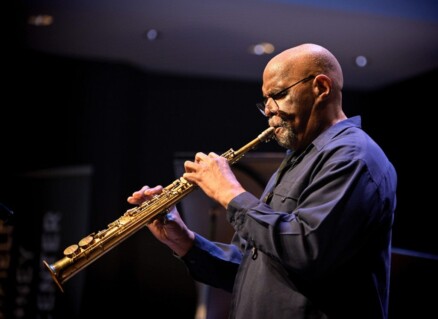Live review | Ishmael Wadada Leo Smith’s freedom ride


Ishmael Wadada Leo Smith
Library of Congress
Sat., Nov. 20, 2010
Iconic trumpeter Ishmael Wadada Leo Smith is an artist who has gained legendary status through his music, his associations and perhaps most of all, his spiritual prescience. Joined by his Golden Quartet, Smith enchanted a full house at the Coolidge Auditorium at the Library of Congress on Saturday.
The auditorium looks like the perfect setting for a performance of “Tartuffe,” rather than the gritty high jazz of the Golden Quartet. Even so, the room was transformed by the first crash of Pheeroan akLaff’s drum, blessing the beginning of the set with a composed solo drum part. John Lindberg’s bass and Vijay Iyer’s piano joined in the fray of composed freedom, the tension building slowly. By the time Smith’s trumpet called, the composition had reached an energetic pinnacle, even without him.
— Luke Stewart has reviewed a series of avant-garde shows this fall. —
The next piece brought the volume and frenetic energy down to a quieter intensity, a trademark of Smith’s compositions. His trumpet sound is definitely indebted to Miles Davis, and his calls conjured familiar images of Miles’ “In a Silent Way” sessions.
Following the quiet intensity of this piece came a groove that again smacked of electric Miles, with Vijay Iyer playing the Rhodes and John Lindberg on a wah-wah-effected bass. True to the Miles-fusion style, the improvisations centered on a steady beat created by the bass line.
The first set featured no breaks, each composition transitioning seamlessly, with directions from Smith in the form of hand signals and occasional ear whispers. It lasted a solid hour.
The second set picked up where the first had left off, featuring an eerie introduction by Vijay Iyer on synthesizer and delay/loop pedal. It bears repeating that the ensemble was influenced by ’70s Miles. Smith even acknowledged to the audience that Miles was “one of the most influential musicians of all time.” However, Smith’s unique perspective and musical journey, as well as the contemporary perspectives of the Golden Quartet, coalesced to create an entirely new musical statement.
Each composition played on Saturday night was part of an 18-part suite inspired by the early days of the Civil Rights Movement. The entire suite, according to Smith, would take nine chamber ensembles and three days to experience in its entirety. The titles of the pieces reflect the suite’s themes (“Brown v. Board of Education,” “Little Rock Nine” and “Freedom Summer” are the names of its three movements). This set of compositions certainly reflects a period of turmoil and change, which remains relevant today, and the music presented was tumultuous and ever-changing. Through all the music’s fits and oscillations, the compositional aptitude of Leo Smith resulted in a powerful statement of historically oriented but forward-thinking music that left a lasting impression.
Something extra must be said of Vijay Iyer and Pheeroan akLaff. All the accolades, critic picks, and other journalistic endorsements aside, Iyer is indeed one of the more creative and unique pianists in jazz today. His playing stood out in the quartet, not in a way that was distracting, but one that brought the ensemble to a higher level. Every note was at the same time complimentary and expansive. In the realm of progressive jazz, it is easy for a pianist to get a bit out of control in his playing, but Iyer exhibited a disciplined approach, knowing exactly when and where to place his notes.
For Pheeroan akLaff, not since I saw the “Art Ensemble of Chicago” (in quotes due to the lack of original members) earlier this year have I seen a drummer as precise as he. On his unusual set featuring two floor toms (one of which was placed to the left of the hi-hat) and a djembe, he gracefully played each composition and improvisation with a griot’s mastery. It was he whom Smith seemed to be communicating with the most. A high point of the concert came during the second set, when they played together as a duo, channeling the energy of the Black Arts Expressionist Movement of the 1970s.
Before the concert began, there was a discussion moderated by local jazz historian and journalist Larry Appelbaum, in which Smith discussed his spirituality, his music, his critics and his compositional approach. Smith’s patented compositional method, called Ahkreanvention, is at once an exhibition of masterful visual and musical expression. He took the time to explain his composition “Pacifica,” inspired by the energies from the Pacific Ocean.
During the audience question-and-answer period, I posed a two-part query, asking what he thought about criticisms that his music is “minimalist,” as well as the influence of the Association for the Advancement of Creative Musicians, or AACM. His answers gave an insight into the depth of his musical being: To the minimalism question, he replied in summary, “I am not a minimalist … People say I’m a minimalist because I play silence.” He explained, “If you play a note then play another, the space in between is more important than the notes before or after.”
To the AACM question, he replied, “When I came to the AACM, I was already writing string quartets, and other compositions. I joined the experimental band and Muhal [Richard Adams] was the only one writing. Then he asked me to start writing for the group, then everyone else started writing.” The entire discussion was filmed and will be released to the public at a later date.
This year has been a great one for the resurgence of progressive jazz into the forefront, as this concert proved with both its location and its attendance. For D.C., the rare appearance of legendary figures such as Smith surely opens the ears of the city’s often-neglected jazz audience. As I have written before, these innovative artists will not neglect D.C. any longer, I hope, as with each appearance, the reception proves very warm and inviting.
AACM, avant-garde, DC, Ishmael Wadada Leo Smith, jazz, Library of Congress, Vijay Iyer, Wadada Leo Smith, Washington


